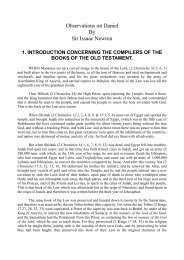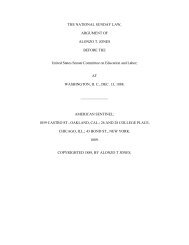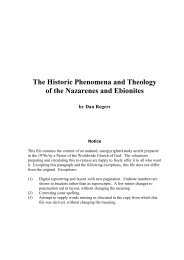Legends of the Shawangunk2 JR.pdf - Friends of the Sabbath ...
Legends of the Shawangunk2 JR.pdf - Friends of the Sabbath ...
Legends of the Shawangunk2 JR.pdf - Friends of the Sabbath ...
You also want an ePaper? Increase the reach of your titles
YUMPU automatically turns print PDFs into web optimized ePapers that Google loves.
46 <strong>Legends</strong> <strong>of</strong> <strong>the</strong> Shawangunk.<br />
It was at a time when thousands <strong>of</strong> oppressed subjects, fleeing from <strong>the</strong> intolerance<br />
and tyranny <strong>of</strong> old Europe, first sought freedom and happiness in <strong>the</strong> new land beyond<br />
<strong>the</strong> seas—<strong>the</strong> America <strong>of</strong> <strong>the</strong> west. William Bull, an Irishman, with no fortune but youth<br />
and a good constitution, imbibing <strong>the</strong> prevalent feeling among all classes, took passage in<br />
an English packet bound for New York. He counted his money—five guineas—to <strong>the</strong><br />
skipper <strong>of</strong> <strong>the</strong> packet, and was told <strong>the</strong> amount would pay for his passage. Arrived in<br />
port he tendered his five guineas, and was gruffly told it was not enough. “But it’s all<br />
I’ve got,” said <strong>the</strong> Irishman. “Then you must be sold to pay <strong>the</strong> balance <strong>of</strong> your passage<br />
money,” said <strong>the</strong> captain. All expostulation was vain; and <strong>the</strong> skipper affected to have no<br />
recollection <strong>of</strong> a previous understanding. William Bull saw he was in <strong>the</strong> captain’s<br />
power; <strong>the</strong> laws <strong>of</strong> England made it obligatory on his part to render an equivalent in hard<br />
labor for <strong>the</strong> balance claimed, and he had no friend to take up his cause against <strong>the</strong><br />
purpose <strong>of</strong> <strong>the</strong> over-reaching captain.<br />
“Then I’ll go back in <strong>the</strong> ship,” said <strong>the</strong> outraged Irishman; “if I’ve got to be a slave,<br />
I’ll be one in my own land!”<br />
It so occurred that Daniel Cromline, who resided on <strong>the</strong> Wawayanda patent, was <strong>the</strong>n<br />
in <strong>the</strong> port at which <strong>the</strong> packet had arrived. The advent <strong>of</strong> a ship in port in those days was<br />
an occasion <strong>of</strong> importance, and always drew a crowd <strong>of</strong> interested persons and curiosity<br />
seekers, and Cromline was among <strong>the</strong> number attracted thi<strong>the</strong>r by <strong>the</strong> novelty. The story<br />
<strong>of</strong> <strong>the</strong> Irish passenger had got abroad, and his case had excited considerable sympathy,<br />
especially as <strong>the</strong> avarice and tyranny <strong>of</strong> sea-captains was a trait by no means rare.<br />
Cromline, being in want <strong>of</strong> a “hand” at his new settlement, forthwith asked to be presented<br />
to <strong>the</strong> distressed passenger. The result <strong>of</strong> <strong>the</strong> interview was that Cromline<br />
advanced an amount covering <strong>the</strong> deficit in Bull’s passage money, and took <strong>the</strong> grateful<br />
Irishman home with him.<br />
William Bull proved to be a great accession to <strong>the</strong> working force <strong>of</strong> <strong>the</strong> new<br />
settlement in <strong>the</strong> wilderness. He was strong and willing, and <strong>of</strong> a mild and hopeful<br />
disposition. He was skillful in <strong>the</strong> use <strong>of</strong> tools, and fertile in expedients—qualities that<br />
were especially valuable where tools were scarce and <strong>the</strong> facilities limited; and where, if<br />
a much-needed article was obtained, it had to be ordered from Holland, or England, and a<br />
year was required to get it.<br />
Daniel Cromline set to work to construct a log mansion that should be far superior to<br />
any house for miles around. As an innovation in <strong>the</strong> building art, <strong>the</strong> puncheon was<br />
discarded, and real boards, sawed by whips in a saw-pit, entered into <strong>the</strong> construction <strong>of</strong><br />
<strong>the</strong> floors and doors, and were held in place with wooden pins. The prime workman and<br />
chief architect was William Bull, but for whose ingenuity and physical strength <strong>the</strong><br />
edifice would have been lacking in many <strong>of</strong> its sterling excellencies.<br />
Though William Bull had emigrated thousands <strong>of</strong> miles from <strong>the</strong> scenes <strong>of</strong> his youth,<br />
and had apparently buried himself in <strong>the</strong> heart <strong>of</strong> a vast wilderness, it must not be<br />
supposed that he had turned savage like <strong>the</strong> wild beasts and Indians by whom he was<br />
surrounded. His young and susceptible heart began to
















